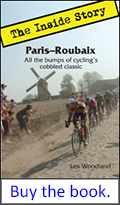

Body Weight and Climbing
or, How Badly Do You Want That Donut?
By Brig Brandt, PCG Elite Coach
Back to Training and Fitness index page

Les Woodland's book Paris-Roubaix: The Inside Story - All the bumps of cycling's cobbled classic is available as an audiobook here. For the print and Kindle eBook versions, just click on the Amazon link on the right.
Brig Brandt writes:
Cyclists are known weight weenies, often spending thousands of dollars to save a pound or two off the bike. But how big is the weight penalty? What’s faster, a bike that’s two pounds lighter or a ten-watt increase in threshold power? Armed with a power meter, a steep climb, and twelve pounds of water, I set out to answer some questions.
Before heading up my local (and much shorter) Alpe d’Huez, I weighed the total mass (me, bike, and clothing) I would be carrying up the hill both with and without the extra bottles. My two different weights were 184.5 pounds and 172.75 pounds. I climbed twice with each weight and maintained (to the best of my ability) the same speed, letting wattage vary.
Obviously, because speed was maintained my times were nearly identical—approximately 5:15 each time. However, my power output was very different: 346 average watts with the water, 311 watts without. The twelve extra pounds required about 10% more power output.
How significant is that thirty watts? Like many things, it depends. If a rider can put out those thirty extra watts but has to exceed his threshold power to do so, then the increased power output comes at significant cost. However, if the rider can meet the increased power demand without exceeding threshold power—that is, without “burning a match”—it will require little cost (at least on a short climb).
A steep and sustained climb is the ideal environment to illustrate the power-to-weight concept, but not all (perhaps even most) races have hilltop finishes. Nevertheless, for most of us, losing a few extra pounds will pay big dividends in all race situations, because most races will include accelerations or climbs somewhere on the course. Getting over these climbs with less power means fewer matches burned for later in the race. If an athlete can lose weight without compromising power output, there is almost always an increase in performance, regardless of the course profile.
Is there ever a trade-off? If a rider keeps losing weight, and presumably some lean muscle mass (i.e., power), will he still climb faster? It simply depends on how much weight is lost and how much less powerful the cyclist is. An already lean cyclist should be very careful when trying to lose weight and should consult a nutritionist before embarking on any nutritional program. Underweight athletes are prone to a long list of health problems.
There are three ways to improve your climbing: Increase threshold power, lose weight, or a combination of the two. Increasing threshold power is arguably the most effective method, as it will also translate into increased power on flat terrain and time trials. A rider carrying excess fat can also improve climbing by losing weight. However, a rider who is already lean will likely lose some lean muscle (and therefore power) if he tries to lose more weight, and this loss in power could trump the benefit of lost weight.
Back to Training and Fitness index page
.








